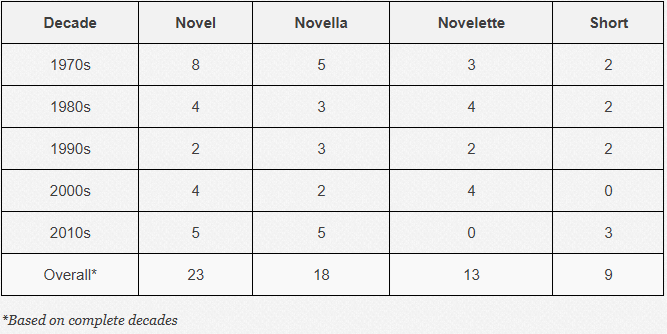by Brian U. Garrison
A poem doesn’t need an award to have impact. But the process of celebrating builds community, excitement, and audience. With the Hugo and Nebula Awards preparing space in their victory gardens for poetry, new gateways are opening for poems to be declared “The Best.”
Not that there’s one ideal path in poems or awards. Without diversity, every poet would just keep writing the same line. Readers, like the eagle stuck eating Prometheus’s liver again and again, would receive no variety. In the words of Science Fiction & Fantasy Poetry Association (SFPA) Grand Master David C. Kopaska-Merkel, “Vive la diversité.” In poems. In readers. In awards. Let there be multitudes.
Find art that is filling.
The beautiful.
The meaningful.
The impactful.
Poetry fills the world fuller every day. Let’s celebrate!
The Expanding Universe
Momentum has been building for short writing: flash, drabbles, poetry, and more. Awards provide gravity, and like spacecraft slingshotting Jupiter, gravity provides acceleration. I feel the excitement orbiting speculative poetry as I talk to poets and see poetry-curious writers sharpen their quills. The poetry world is spinning faster than Rumpelstiltskin turns straw to gold. May it be unstoppable. More excitement means more poems! More readers!
Each poem written is a skein of yarn. Each reader is woven into the universe’s deep magic. Interconnection among writers, readers, or any group of people builds cohesion. We won’t agree. And yes, declaring one “best” poem is inherently exclusive. But if we enter the journey accepting fuzzy boundaries, picking a winner is one way to see the fabric that binds us.
Watching threads become networks—watching poetry spread—readers are reminded that some poets are even alive. Poems have been written this decade. This year. Today! Annual awards are a reminder that your syllabus, to-be-read pile, and conversations can include more than just a bunch of dead white guys.
F. J. Bergmann, SFPA’s newest Grand Master, mentioned an article she once read asking speculative novelists how poetry influenced their writing. As writers gushed about their love of poetry, Bergmann was not impressed. “Every one of them cited the out-of-date warhorses they’d been assigned to read in high school or college intro to lit classes,” she said. Sure, there are a lot of excellent poems from long ago, but the proliferation of speculative poetry awards can help you find shiny new poems that are more precious than mithril. (Or to avoid the dead-white-guy reference: soul-guarding poems more potent than kenet, the dragon-fire-protective ointment imagined by Robin McKinley).
Miguel O. Mitchell, Dwarf Stars Editor (2023, 2025), similarly advocates for readers to explore a wide range of poetry: short and long poems, poems by writers known and unknown. Mitchell hopes readers will “discover gems from the less famous [writers].” In poetry lists, you may recognize names from past Nebula or Hugo ballots such as Amal El-Mohtar, Beth Cato, Theodora Goss, and Jane Yolen. You should definitely read their poetry, and as you admire words by familiar writers, take a peek at nearby poems too. Many journals publish online and are free to read. Open as browser tabs impulsively! Read for awards, and sometimes just for the love of words.
Awards in Abundance
How do we celebrate excellent speculative poetry? “The work of SFPA has always been to model some of the many possible ways…but we’re by no means the only arbiters of taste,” says Bryan Thao Worra, SFPA President from 2016 to 2022 and first Lao American member of the Horror Writers Association (HWA). Awards typically focus on one poem, a book/chapbook, or a writer. SFPA has been presenting the Rhysling Award since 1978 and has been adding to its bouquet of awards.
SFPA’s Rhysling Award goes to an individual poem in two categories: short and long. Since adding the Grand Master Award in 1999, the group has named twelve worthy poets. The Dwarf Stars Award has been praising very short poems since 2006. Books and chapbooks have been earning the Elgin Award since 2013. Most recently, the Lifetime Service Award was established in 2023. SFPA has been cultivating excitement and awards for decades.
Others have picked up on the excitement. The HWA was an early adopter, adding Best Poetry Collection to their Bram Stoker selections in 2000. They have also published an annual Poetry Showcase since 2014, providing a celebration without an associated award.
From the World Science Fiction Society (WSFS) at Seattle Worldcon 2025, one Best Poem will win a Hugo Award. Seattle chose to add the special category, but the category will go away unless the bylaws are amended (fortunately, there is an initiative to add that amendment). Worldcon 2025 also named WSFS’s first Poet Laureate, Brandon O’Brien. I hope other conventions follow the lead!
Starting in 2026, SFWA will bestow a Nebula Award to one Best Poem each year. I look forward to seeing the suggested reading list and first year of finalists.
When I asked multi-award-winning New Zealand writer Lee Murray for her thoughts, she emphasized, “Different awards address different aspects of poetry.” The awards discussed here are still rather US-centric. Murray pointed out that regional awards, small communities, and connecting with non-spec writing communities all expand the influence of speculative poetry.
Group Decisions
Will the voting groups agree? Hugo and Nebula voters pick the same novel a little under half the time. There’s less convergence as word count shrinks. Novellas, novelettes, and short stories are each less likely to win both awards.
Count of Shared Hugo and Nebula Wins by Decade and Category

With poetry’s abundant candidates, I suspect nominations and votes will root far and wide. Thao Worra agrees that one poem is unlikely to win everything, “and that’s good for the field,” he says.
If the Hugos do not adopt poetry long term, then the awards from SFPA and SFWA will be the top tastemakers for individual speculative poems written in English. It will be interesting to see how the distinct-yet-overlapping communities agree and disagree on “The Best.”
Looking Forward
What else can I say other than “I hope you participate”?
Poetry is brevity, gravity, and line breaks. It is the good kind of dangerous. It can shatter your world and open new universes—parallel, perpendicular, and oblique.
Read.
Celebrate.
Vote!
Explore more articles from SPECULATIVE POETICS
 Brian U. Garrison (he/him) writes poetry for children, adults, and grand adults. He has been a member of the Science Fiction and Fantasy Poetry Association (SFPA) since 2012 and was elected President in 2025. He joined SFWA in 2023. His work on the Rhysling Awards includes co-editing the anthology (2022, 2024), leading the effort to add a jury process, and shepherding volunteers. He is a program volunteer with Seattle Worldcon 2025 but is not part of the awards team. Brian’s chapbooks include New Yesterdays New Tomorrows (self-published) and Micropoetry for Microplanets (Space Cowboy Books). He lives under a tall, leafy tree in Portland, Oregon. More at www.bugthewriter.com.
Brian U. Garrison (he/him) writes poetry for children, adults, and grand adults. He has been a member of the Science Fiction and Fantasy Poetry Association (SFPA) since 2012 and was elected President in 2025. He joined SFWA in 2023. His work on the Rhysling Awards includes co-editing the anthology (2022, 2024), leading the effort to add a jury process, and shepherding volunteers. He is a program volunteer with Seattle Worldcon 2025 but is not part of the awards team. Brian’s chapbooks include New Yesterdays New Tomorrows (self-published) and Micropoetry for Microplanets (Space Cowboy Books). He lives under a tall, leafy tree in Portland, Oregon. More at www.bugthewriter.com.

